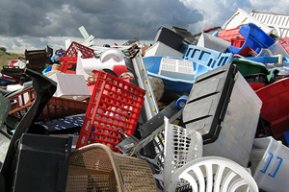Environmental Issues with Plastic
Environmentally, plastic is a growing disaster. Most plastics are made from petroleum or natural gas, non-renewable resources extracted and processed using energy-intensive techniques that destroy fragile ecosystems.
The manufacture of plastic, as well as its destruction by incineration, pollutes air, land and water and exposes workers to toxic chemicals, including carcinogens.
Plastic packaging – especially the ubiquitous plastic bag – is a significant source of landfill waste and is regularly eaten by numerous marine and land animals, to fatal consequences. Synthetic plastic does not biodegrade. It just sits and accumulates in landfills or pollutes the environment. Plastics have become a municipal waste nightmare, prompting local governments all over the world to implement plastic bag, and increasingly polystyrene (styrofoam), bans.
Plastic pollution may not even be visible to the naked eye as research is showing that microscopic plastic particles are present in the air at various locations throughout the world and in all major oceans. Plastic is now ubiquitous in our terrestrial, aquatic and airborne environments - that is, it's everywhere.





